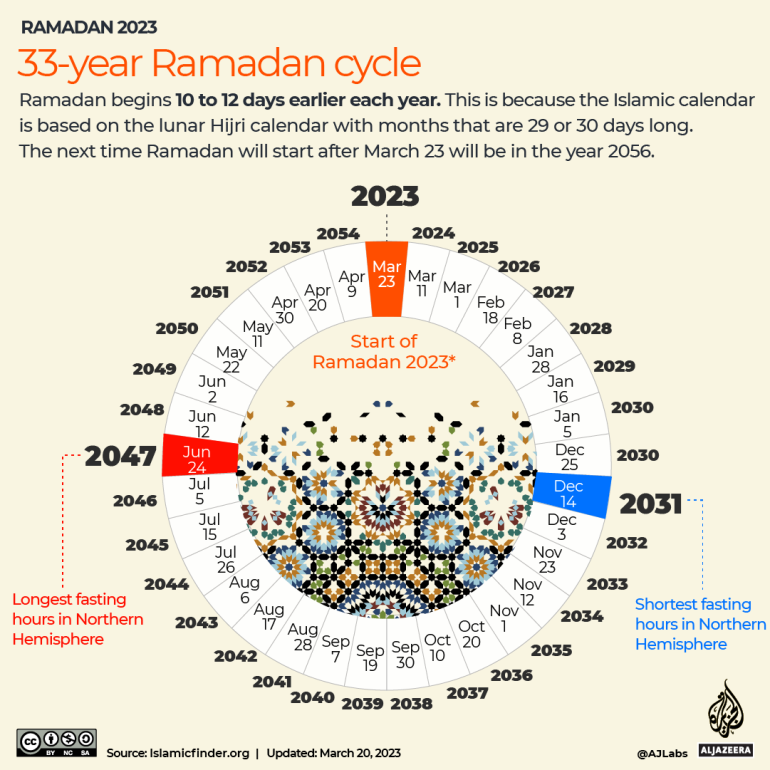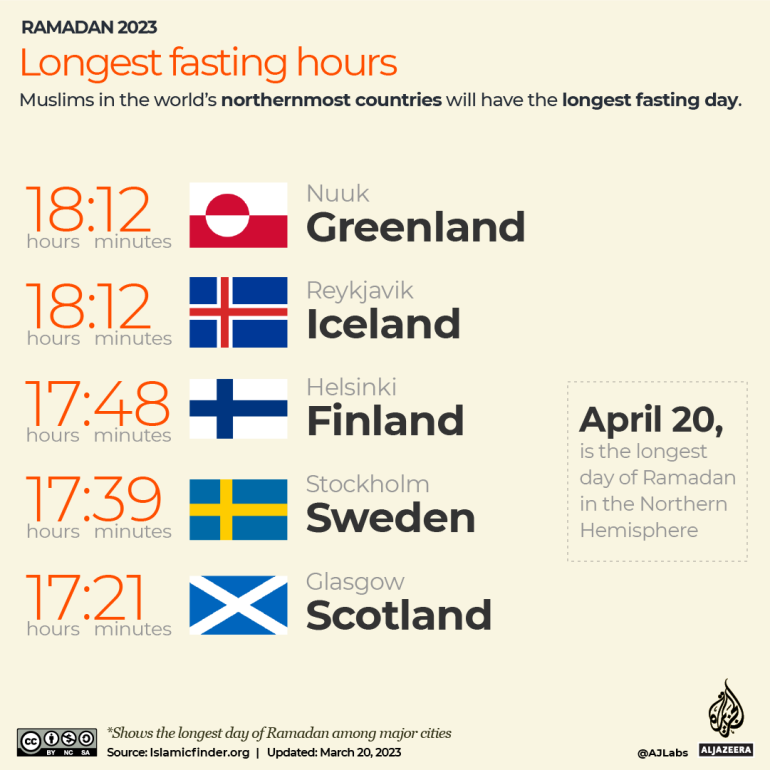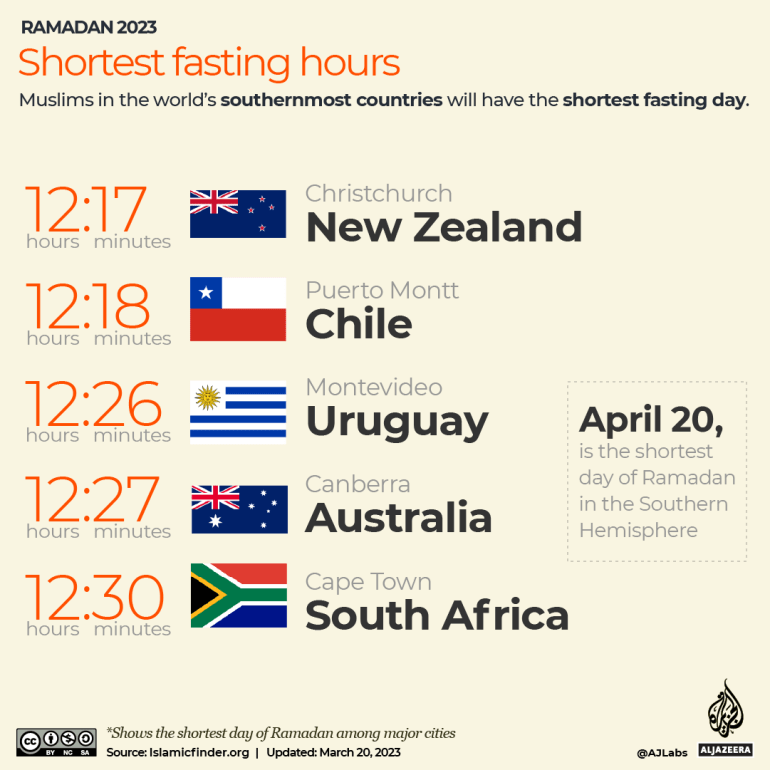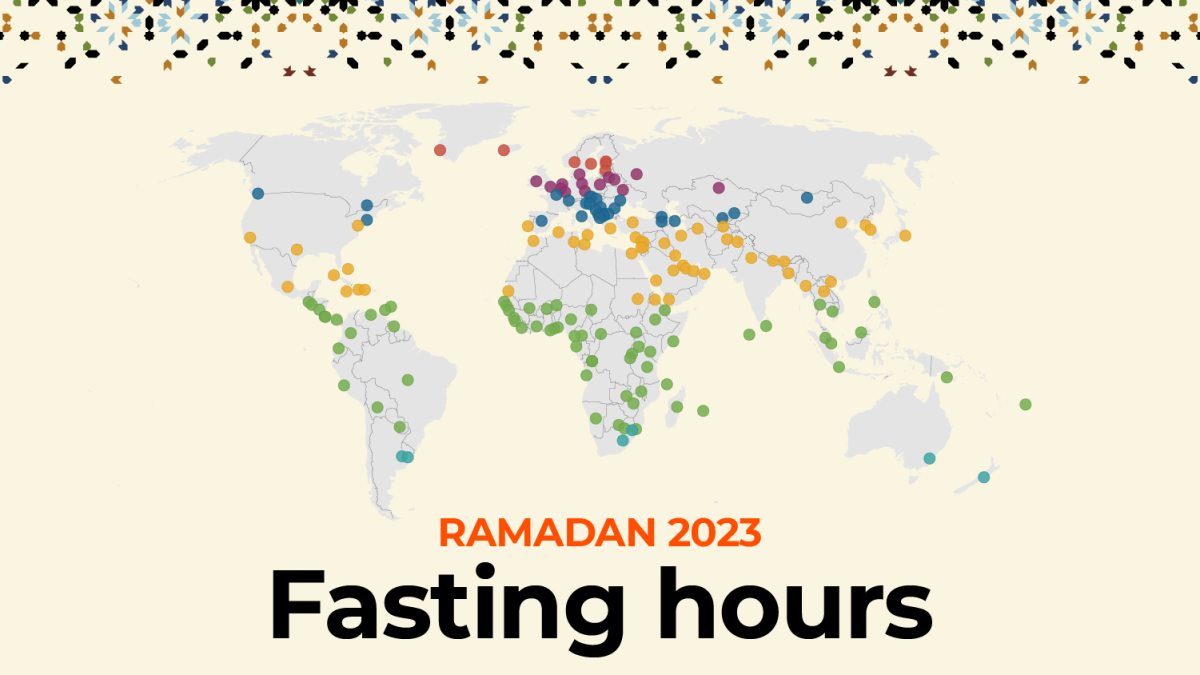The Muslim holy month of Ramadan will begin later this week. The pre-sunrise to sunset fast lasts anywhere from 12 to 18 hours, depending on where you are in the world.
Muslims believe that Ramadan is the month when the first verses of the holy book Quran were revealed to the Prophet Muhammad more than 1,400 years ago.
The fast entails abstinence from eating, drinking, smoking and sexual relations during daylight hours to achieve greater “taqwa”, or consciousness of God.
Why does Ramadan start on different dates every year?
Ramadan begins 10 to 12 days earlier each year. This is because the Islamic calendar is based on the lunar Hijri calendar with months that are 29 or 30 days long.
This year, the first day of fasting in Mecca will likely be Thursday, March 23, depending on the sighting of the new moon.
Because the lunar year is shorter than the solar year by 11 days, Ramadan will be observed twice in the year 2030 – first beginning on January 5 and then starting on December 25.
The next time Ramadan will start after March 23 will be 33 years from now – in the year 2056.

Fasting, iftar times around the world
The number of daylight hours varies across the world.
Muslims living in the world’s southernmost countries, such as Chile or New Zealand, will fast for an average of 12 hours while those living in northernmost countries, such as Iceland or Greenland, will have 17-plus hours fasts.
For Muslims living in the Northern Hemisphere, the number of fasting hours will be a bit shorter this year and will continue to decrease until 2031, which is the year Ramadan will encompass the winter solstice – the shortest day of the year. After that, fasting hours will increase until the summer solstice – the longest day of the year in the Northern Hemisphere.
For Muslims living south of the equator, the opposite will happen.
The predawn meal to start the daily fast is called suhoor, while the breaking of one’s fast after sunset is called iftar.
Click or hover over the dots on the map below to see the suhoor and iftar times on the first day of Ramadan 2023.
In extreme northernmost cities, such as Longyearbyen in Norway, where the sun does not set from April 20 to August 22, religious rulings have been issued to follow timings in Mecca, Saudi Arabia, or the nearest Muslim country.
Below are the average number of fasting hours in cities around the world. Actual fasting hours and times will vary by day, as well as calculation methods:
Which cities have the longest fasting hours?
– Nuuk, Greenland: 17 hours
– Reykjavik, Iceland: 17 hours
– Helsinki, Finland: 17 hours
– Stockholm, Sweden: 17 hours
– Glasgow, Scotland: 17 hours

– Amsterdam, the Netherlands: 16 hours
– Warsaw, Poland: 16 hours
– London, UK: 16 hours
– Astana, Kazakhstan: 16 hours
– Brussels, Belgium: 16 hours
– Paris, France: 15 hours
– Zurich, Switzerland: 15 hours
– Bucharest, Romania: 15 hours
– Ottawa, Canada: 15 hours
– Sofia, Bulgaria: 15 hours
– Rome, Italy: 15 hours
– Madrid, Spain: 15 hours
– Lisbon, Portugal: 14 hours
– Athens, Greece: 14 hours
– Beijing, China: 14 hours
– Washington, DC, US: 14 hours
– Pyongyang, North Korea: 14 hours
– Ankara, Turkey: 14 hours
– Rabat, Morocco: 14 hours
– Tokyo, Japan: 14 hours
– Islamabad, Pakistan: 14 hours
– Kabul, Afghanistan: 14 hours
– Tehran, Iran: 14 hours
– Baghdad, Iraq: 14 hours
– Beirut, Lebanon: 14 hours
– Damascus, Syria: 14 hours
– Cairo, Egypt: 14 hours
– Jerusalem: 14 hours
– Kuwait City, Kuwait: 14 hours
– Gaza City, Palestine: 14 hours
– New Delhi, India: 14 hours
– Hong Kong: 14 hours
– Dhaka, Bangladesh: 14 hours
– Muscat, Oman: 14 hours
– Riyadh, Saudi Arabia: 14 hours
– Doha, Qatar: 14 hours
– Dubai, UAE: 14 hours
– Aden, Yemen: 14 hours
– Addis Ababa, Ethiopia: 13 hours
– Dakar, Senegal: 13 hours
– Abuja, Nigeria: 13 hours
– Colombo, Sri Lanka: 13 hours
– Bangkok, Thailand: 13 hours
– Khartoum, Sudan: 13 hours
– Kuala Lumpur, Malaysia: 13 hours

Which cities have the shortest fasting hours?
– Singapore: 13 hours
– Nairobi, Kenya: 13 hours
– Luanda, Angola: 13 hours
– Jakarta, Indonesia: 13 hours
– Brasilia, Brazil: 13 hours
– Harare, Zimbabwe: 13 hours
– Johannesburg, South Africa: 13 hours
– Buenos Aires, Argentina: 12 hours
– Ciudad del Este, Paraguay: 12 hours
– Cape Town, South Africa: 12 hours
– Montevideo, Uruguay: 12 hours
– Canberra, Australia: 12 hours
– Puerto Montt, Chile: 12 hours
– Christchurch, New Zealand: 12 hours
Ramadan greetings in different languages
Various Muslim-majority nations have a personalised greeting in their native languages.
“Ramadan Mubarak” and “Ramadan Kareem” are common greetings exchanged in this period, wishing the recipient a blessed and generous month, respectively.

